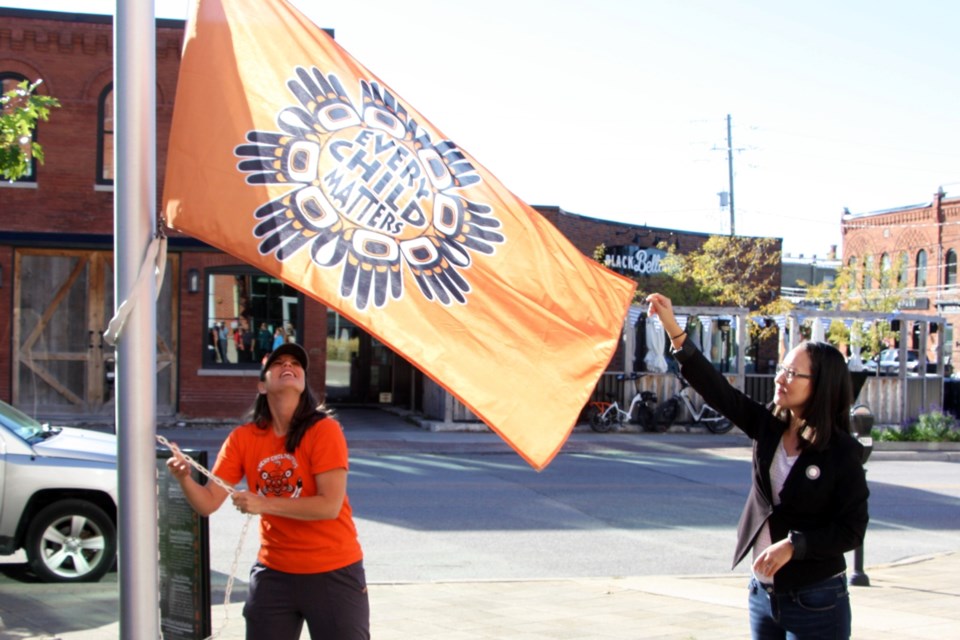Jillian Morris is Kanien’kehá:ka, turtle clan and band member of Six Nations of the Grand River Territory now living in Collingwood. She will be sharing stories and experience passed down through the oral traditions of Kanien’kehá:ka culture in her regular column, entitled Ka’nikonhrí:io, (The Good Mind) published on CollingwoodToday.ca.
*****
Shé:kon sewakwé:kon, greetings all. Nia:wen, thank you for joining me again this month.
September is coming to an end. Preparations for the National Day for Truth and Reconciliation (NDTR) are about to pay off. It’s been a challenge to try and balance providing education and sharing experiences while protecting the boundaries of self, family, and Indigenous community members. I’m still trying to hang on to my own advice of slowing down.
NDTR, what it represents, and the stories it shines a light on, is a day of reflection for most Canadians. It is every day for Indigenous people.
This isn’t to imply that we dwell daily on the legacy of colonization. The teachings and virtues encoded in our traditional stories and cultures hit with exceptional resonance and lead to a purposeful, dutiful life. Reclaiming our birthright also means acknowledging our responsibility to protect what our ancestors ensured survived. I keep that history close to remind me why I need to keep going.
Poetry and essay-style writing has been a means for me to express the mess of emotion and internal dialogue that comes from being a product of colonialism, Indigenous erasure, and, most importantly, ancestral love. I push through the junk while also attempting to pick up all the treasures that hide in the rubble. It means digging through some heavy pieces.
I know that I am only one Indigenous voice. I speak only for myself but with the intention to encourage readers to seek out more Indigenous voices. I hope to promote empathy, compassion, and hope in this climate of reconciliation.
At this time, I tend to get questions related to, what is now commonly referred to as allyship – Canadians who want to understand what it means to be an inheritor of treaties between First Peoples and settlers. Those that want to be actively involved in returning to ideas of peaceful or at least respectful co-existence.
Care for and show gratitude to the natural world. Treat Mother Earth like you depend on her generosity because of course, you do. Respond in kind.
Take time to really understand Indigenous social movements. A 2019 study led by the University of British Columbia showed “researchers analyzed land and species data from Australia, Brazil and Canada – three of the world's biggest countries – and found that the total numbers of birds, mammals, amphibians and reptiles were the highest on lands managed or co-managed by Indigenous communities.”
This is the meat of Land Back. Generations and generations of ecological data has been collected and retained within the Indigenous knowledge that is passed down.
When the choice is walk away from ignorance or take the opportunity to educate, my sense of duty to my ancestors takes precedence. Having similar conversations repeatedly is stifling. I would welcome a little extra space to breathe. Share what you learn, pass on resources, have meaningful conversations with family about reconciliation.
Indigenous people are still expected to adapt to foreign systems and policies. Support Indigenous-led education, justice, child welfare – that which allows us to be self-determining.
Listen, read, watch, take in, engage. Don’t stop after the day. It’s hard to see reconciliation used as a buzzword that promotes rhetoric and no follow-through. Turn that buzz into busy. My simple request is that you make an effort to learn what should have been taught to all Canadians.
You do get to choose how you participate in reconciliation. A privilege we were never afforded.
Skén:nen, peace.



